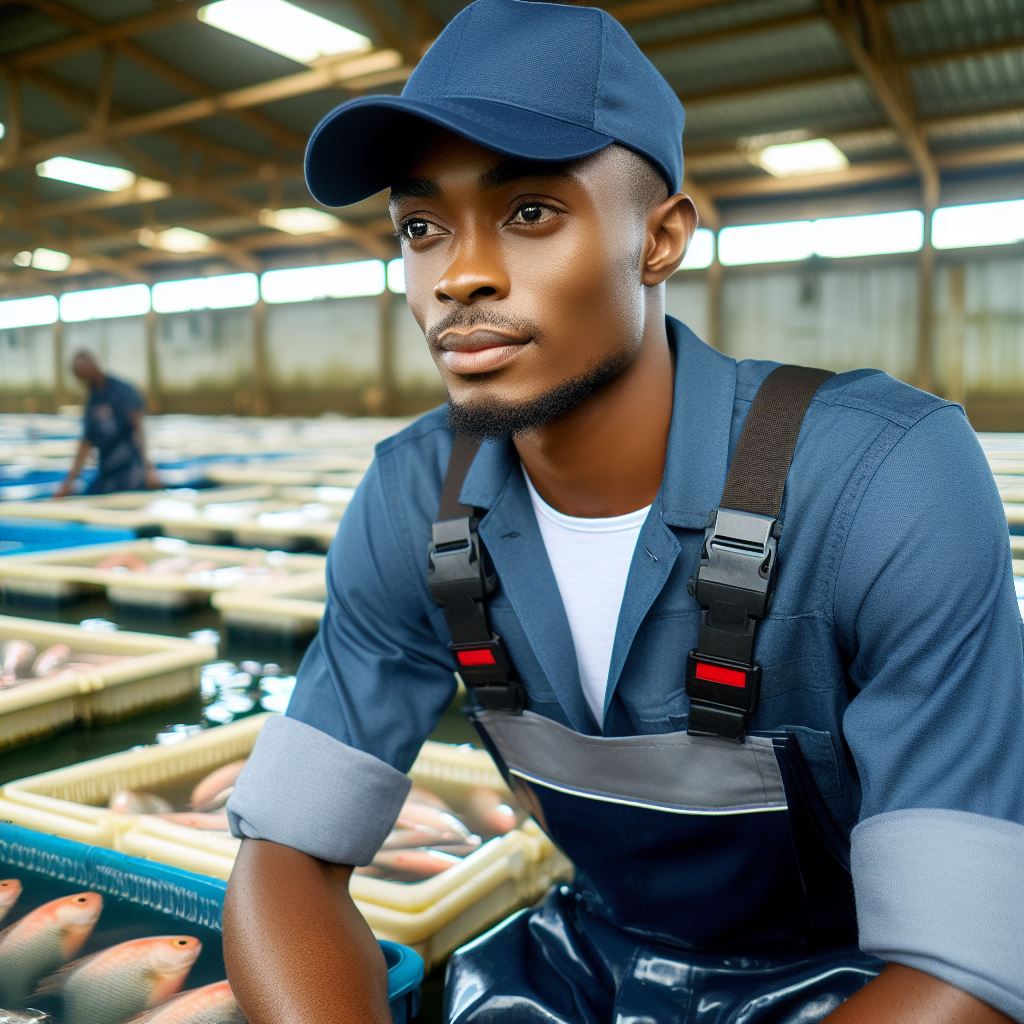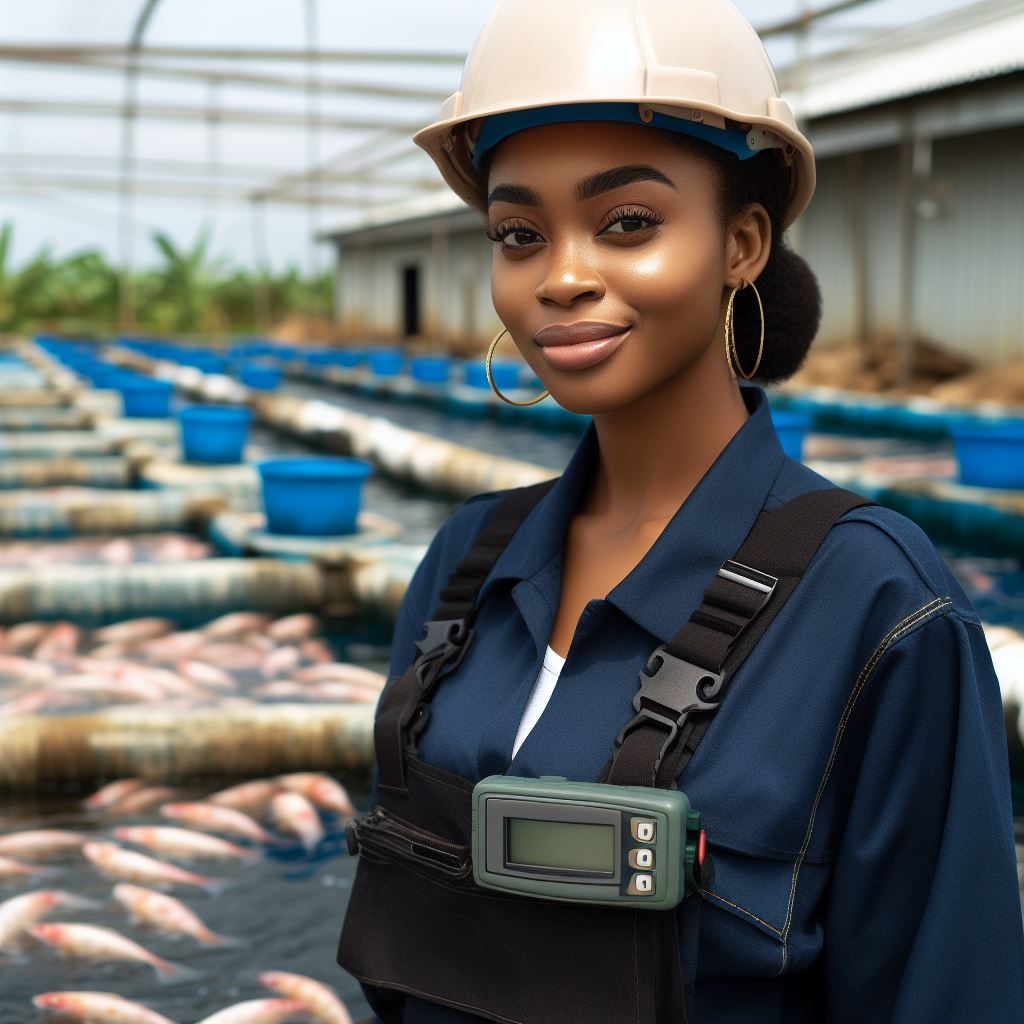Introduction
Aquaculture education, vital for sustainable fish farming, teaches techniques, management, and ecological balance in fishery.
Nigeria, known for its vast aquatic resources, witnesses the significance and rapid expansion of aquaculture.
Aquaculture education lays the foundation for proficient fish farming, encompassing various methodologies, including breeding, nutrition, and disease control.
In Nigeria, the evolution of aquaculture education parallels the country’s recognition of its aquatic potential and the pressing need for food security.
The significance of aquaculture education in Nigeria can’t be overstated, as it bolsters the nation’s economy through employment and nutritional sustenance.
Over the years, Nigeria’s aquaculture sector has experienced substantial growth, catering to the escalating demand for fish protein.
The introduction of specialized aquaculture training programs and courses in Nigerian educational institutions signifies the industry’s burgeoning importance.
Notably, universities and research institutes in Nigeria now offer aquaculture-related degrees and diplomas, fostering expertise in fishery management.
Aquaculture’s role in addressing food insecurity and poverty in Nigeria underscores its pivotal importance in national development agendas.
The growth of aquaculture education in Nigeria mirrors the country’s commitment to sustainable development and economic diversification.
The upcoming sections delve into the historical trajectory, milestones, challenges, and future prospects of aquaculture education in Nigeria.
Origins of Aquaculture Education in Nigeria
Aquaculture education in Nigeria has a rich history that dates back to the establishment of the University of Ibadan.
This educational institution served as the primary catalyst for the development and growth of aquaculture education in the country.
Early pioneers and institutions involved
The pioneers of aquaculture education in Nigeria understood the importance of building a strong foundation for the field.
They recognized the need to train professionals who could contribute to the growth and sustainability of the aquaculture industry.
The establishment of the University of Ibadan in 1948 provided the ideal platform for this educational initiative.
In addition to the efforts of educational institutions, government agencies and foreign organizations also played crucial roles in the development of aquaculture education in Nigeria.
These external entities recognized the potential of Nigeria’s vast aquatic resources and the need for a skilled workforce to harness their full potential.
Introduction of formal aquaculture courses
As aquaculture gained recognition as a viable industry, formal courses in the field were introduced.
Curriculum development became a priority, aiming to provide students with a comprehensive understanding of aquaculture principles and practices.
The goal was to create a curriculum that combined theoretical knowledge with practical skills, ensuring graduates were capable of addressing real-world challenges in aquaculture.
Early aquaculture research and practical training sessions were also integrated into the educational programs.
This approach allowed students to gain hands-on experience and develop necessary technical skills.
The emphasis on practical training aimed to bridge the gap between academia and industry, preparing graduates for their future roles in the field.
Despite the challenges faced in the early years, aquaculture education in Nigeria continued to evolve.
Today, there are several universities and educational institutions offering dedicated aquaculture programs and courses.
These institutions collaborate with industry partners, government agencies, and research organizations to keep pace with the changing needs of the aquaculture sector.
The origins of aquaculture education in Nigeria can be traced back to the pioneering efforts of individuals, the establishment of educational institutions, and the support of government agencies and foreign organizations.
The introduction of formal aquaculture courses and the integration of practical training have further strengthened the educational foundation in the field.
As Nigeria’s aquaculture industry continues to grow, the importance of quality education and training in this sector cannot be overstated.
Read: Environmental Hazards & Their Impact on Nigerian Crops
Development and Expansion of Aquaculture Education
Aquaculture education in Nigeria has seen significant development and expansion over the years, as the country recognizes the importance of this sector in meeting food security challenges and promoting economic growth.
Incorporation of aquaculture programs in universities
The incorporation of aquaculture programs in universities has contributed to the growth of the sector in Nigeria.
The Nigerian Institute for Oceanography and Marine Research (NIOMR) has been at the forefront of this development, playing a vital role in training and capacity building.
With its expertise in marine research and aquatic sciences, NIOMR has been instrumental in curriculum development and providing necessary infrastructure for aquaculture education.
In addition to NIOMR, several universities in Nigeria have recognized the importance of aquaculture and have established specialized programs.
The University of Lagos and the University of Port Harcourt are notable examples.
These institutions offer comprehensive courses on aquaculture, covering various aspects such as fish nutrition, breeding techniques, farm management, and disease control.
Collaboration with international organizations and foreign universities
Collaboration with international organizations and foreign universities has further enhanced the development of aquaculture education in Nigeria.
Through technical assistance and exchange programs, Nigerian students and faculty have been able to gain exposure to international best practices and innovative techniques in aquaculture.
Transform Your Career with Expert Guidance
Get personalized mentorship consulting that’s tailored to your unique path. Our expert advice is actionable and exclusive.
Get StartedThis knowledge transfer has been crucial in improving the quality of education and research in the field.
Joint research projects between Nigerian universities and foreign institutions have also been instrumental in driving the expansion of aquaculture education.
These projects address key challenges faced by the aquaculture sector in Nigeria, such as sustainable production practices, disease management, and market development.
The collaborative nature of these initiatives allows for the sharing of expertise and resources, leading to innovative solutions and advancements in the field.
Capacity building initiatives have been another important outcome of collaboration with international partners.
Nigerian universities have benefited from training programs conducted by foreign experts, which have helped build the necessary technical expertise and skills among faculty and students.
This has not only improved the quality of aquaculture education but also contributed to the overall development of the aquaculture industry in Nigeria.
In fact, aquaculture education in Nigeria has witnessed significant development and expansion through the incorporation of programs in universities and collaboration with international organizations and foreign universities.
These efforts have not only improved the quality of education but also contributed to the growth and sustainability of the aquaculture sector in the country.
Read: Livestock Management: A Focus of Nigerian Animal Science
Challenges Faced in Aquaculture Education
Inadequate infrastructure and equipment
- The lack of proper facilities hinders the progress of aquaculture education in Nigeria.
- Insufficient laboratories and research centers limit the practical training opportunities for students.
- Outdated equipment and technology fail to provide students with hands-on experience and skills needed in the field.
- Inadequate funding prevents the improvement of infrastructure, hindering the growth of aquaculture education.
Shortage of qualified instructors and researchers
- The scarcity of qualified instructors poses a major challenge in aquaculture education.
- Limited availability of experienced personnel limits the knowledge transfer and practical training.
- Insufficient research staff hampers the development of innovative techniques and advancement in aquaculture.
- The shortage of qualified instructors and researchers affects the quality of education imparted to students.
Limited funding and support from the government
- Insufficient financial support from the government hampers the development of aquaculture education.
- Limited budget allocation leads to a lack of necessary resources and materials for effective teaching.
- Inadequate funding restricts the establishment of well-equipped research and training facilities.
- The lack of government support impedes the growth and expansion of aquaculture education in Nigeria.
Socio-economic constraints for students
- Many students face socio-economic constraints that hinder their access to aquaculture education.
- Limited financial resources prevent students from enrolling in aquaculture programs.
- The high cost of practical training and fieldwork restricts opportunities for hands-on learning.
- Some students are forced to abandon their education due to the financial burden associated with pursuing a career in aquaculture.
In short, aquaculture education in Nigeria faces numerous challenges that need to be addressed for its growth and improvement.
The inadequate infrastructure and equipment, shortage of qualified instructors and researchers, limited funding and government support, and socio-economic constraints for students all contribute to the barriers faced in aquaculture education.
It is crucial for the government and relevant stakeholders to prioritize the development of aquaculture education by addressing these challenges and providing necessary resources, funding, and support.
Only through overcoming these obstacles can Nigeria ensure the future success and sustainability of its aquaculture industry.
Read: Study Tips for Aspiring Crop Protection Students in Nigeria

Recent Advancements and Achievements
Modernization of aquaculture education facilities
- Upgrading facilities has been a significant stride in improving aquaculture education in Nigeria.
- State-of-the-art laboratories and learning spaces equipped with modern technology have been established.
- These facilities provide students with practical skills and exposure to the latest aquaculture practices.
- Modernized aquaculture education facilities create an environment conducive for innovative research and learning.
Increased government support and investment
- The Nigerian government has recognized the importance of aquaculture and has increased its support.
- Investments in infrastructure, research, and training have significantly boosted the development of aquaculture education.
- Government funding has enabled the expansion of aquaculture schools and the recruitment of expert faculty.
- Scholarships and grants are also provided to attract talented students and encourage their involvement in the sector.
Research breakthroughs and technology adoption
- Aquaculture research in Nigeria has witnessed remarkable breakthroughs, thanks to the dedication of scientists and researchers.
- The adoption of advanced technologies such as genetic improvement, feed formulation, and disease control has revolutionized the industry.
- Cutting-edge research findings are integrated into the curriculum, exposing students to the latest scientific advancements.
- The continuous collaboration between research institutions and aquaculture educators ensures the dissemination of up-to-date knowledge.
Expansion of aquaculture-related industries in Nigeria
- Aquaculture education has played a crucial role in the growth of aquaculture-related industries in Nigeria.
- Graduates equipped with practical skills meet the increasing demand for skilled aquaculture professionals.
- The expansion of fish processing, feed production, and aquaculture consultancy services has created employment opportunities.
- Collaboration between aquaculture schools and industry players has allowed for internships and industry-driven research projects.
In general, recent advancements and achievements in aquaculture education in Nigeria have yielded significant progress.
The modernization of facilities, increased government support and investment, research breakthroughs, and the expansion of aquaculture-related industries have propelled the sector forward.
These advancements provide students with enhanced learning experiences and pave the way for the sustainable development of aquaculture in Nigeria.
Read: Animal Welfare and Ethics: Teaching in Nigerian Universities
Current State and Future Prospects
Growing recognition and importance of aquaculture education
Aquaculture education in Nigeria has gained growing recognition and importance in recent years.
The government and various stakeholders have realized the potential of aquaculture in addressing food security and promoting economic growth.
This recognition has led to increased support and funding for aquaculture education across the country.
The private sector and foreign investors have also recognized the opportunities in aquaculture education in Nigeria.
Collaboration opportunities with private sector and foreign investment
There are increasing collaboration opportunities between educational institutions and private companies or foreign entities.
These collaborations provide valuable resources and expertise to enhance the quality of aquaculture education in Nigeria.
Furthermore, the involvement of the private sector and foreign investment brings new technologies and innovation to the industry.
Need for continuous development and improvement
Continuous development and improvement are crucial for the growth of aquaculture education in Nigeria.
There is a need for regular curriculum updates to align with industry trends and technological advancements.
Universities and training centers should also invest in research and development to address emerging challenges in aquaculture.
This will ensure that graduates are equipped with the necessary knowledge and skills to contribute to the industry.
Potential role in food security and economic growth in Nigeria
Aquaculture education has the potential to play a significant role in achieving food security in Nigeria.
As the population continues to grow, traditional fishing methods alone will not be sufficient to meet the demand for fish.
By training individuals in aquaculture techniques, Nigeria can increase its domestic fish production and reduce reliance on imports.
This will not only improve food security but also contribute to the country’s economic growth.
Aquaculture has the potential to create employment opportunities and stimulate economic activities in rural areas.
By promoting aquaculture education, the government can harness the economic potential of the sector and uplift communities.
In review, aquaculture education in Nigeria is steadily growing and gaining recognition.
The collaboration opportunities with the private sector and foreign investment present exciting prospects for the future.
However, continuous development and improvement are necessary to meet industry demands and challenges.
Aquaculture education has the potential to contribute significantly to food security and economic growth in Nigeria.
Uncover the Details: Wildlife Reserves and Protected Areas in Nigeria
Conclusion
Summary of Aquaculture Education Development in Nigeria
Nigeria’s aquaculture education evolved from rudimentary beginnings, tracing back to basic fish farming practices.
Over time, dedicated efforts transformed it into a structured curriculum.
The Significance and Potential of Aquaculture Education for Nigeria’s Future
Aquaculture education stands as a beacon illuminating Nigeria’s path to sustainable food security and economic growth.
It offers a gateway to alleviate poverty and enhance nutritional standards.
Encouragement for Individuals Interested in Pursuing Aquaculture Education
For aspiring aquaculturists, seizing opportunities in this burgeoning field is pivotal.
Embrace learning within formal institutions or through hands-on experiences to hone practical skills.
As the chapter draws to a close, Nigeria’s aquaculture education journey emerges as a testament to perseverance and progress.
Its trajectory, from humble roots to structured programs, underscores the nation’s commitment to harnessing aquatic resources.
The potential of aquaculture education in Nigeria’s future cannot be overstated.
It serves as a catalyst for economic development, job creation, and food sufficiency.
By equipping individuals with specialized knowledge, it empowers them to contribute meaningfully to the nation’s growth.
To those captivated by the prospects of aquaculture education, a wealth of opportunities awaits.
Pursue formal education in aquaculture sciences, fisheries management, or related fields.
Engage in internships, apprenticeships, or research projects to gain practical insights.
In closing, aspiring aquaculturists hold the key to shaping Nigeria’s aquatic landscape.
Embrace the challenges and rewards this field offers.
Your dedication and expertise can propel Nigeria towards a prosperous and sustainable future anchored in the waters that surround it.




